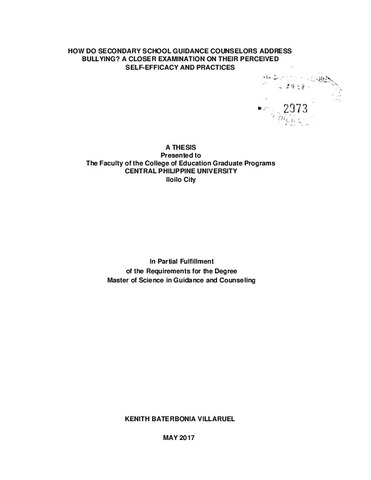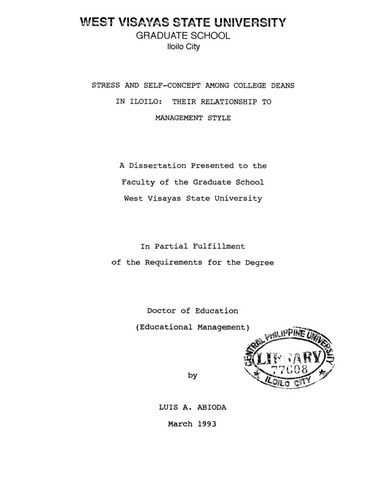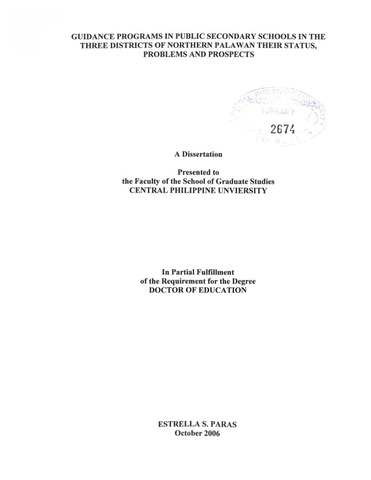Ipakita ang simpleng tala ng item
Multiple role stress and coping styles of guidance counselors in higher education institutions
| dc.contributor.adviser | Adelantar, Methuselah V. | |
| dc.contributor.author | Tragico, Gift D. | |
| dc.coverage.spatial | Iloilo | en_US |
| dc.date.accessioned | 2021-10-07T02:53:08Z | |
| dc.date.available | 2021-10-07T02:53:08Z | |
| dc.date.issued | 2006 | |
| dc.identifier.citation | Tragico, G. D. (2006). Multiple role stress and coping styles of guidance counselors in higher education institutions (Unpublished Master’s thesis). West Visayas State University, Iloilo City. | en_US |
| dc.identifier.uri | https://hdl.handle.net/20.500.12852/1500 | |
| dc.description | Abstract only | en_US |
| dc.description.abstract | The main purpose of this study was to determine the multiple role stress and coping styles among guidance counselors of higher education institutions in Iloilo City. Respondents of the study were the 71 randomly selected guidance counselors classified according to sex, age, civil status, educational attainment, and number of dependents. A duly validated researcher made questionnaire was used in this study. Frequency, percentage, rank, and means were the descriptive statistics employed and the inferential statistics used were the t-test for independent samples, One-way Analysis of Variance, and Pearson's r. The .05 alpha level was employed as the criterion for the acceptance or rejection of the null hypotheses. The result of the study revealed that the guidance counselors of higher education institutions whether taken as an entire group or classified as to certain categories agreed that they have experienced multiple role stress and employed coping styles. Findings further revealed that there were no significant differences in the multiple role stress among guidance counselors when grouped according to sex, age, civil status, highest educational attainment, and number of dependents. When classified according to age and highest educational attainment, the result showed that there were significant differences in the coping styles among guidance counselors. Findings further revealed that there were no significant differences among the coping styles of guidance counselors when grouped according to sex, civil status, and number of dependents. Finally, there was no significant relationship between the guidance counselors' multiple role stress and their coping styles. | en_US |
| dc.format.extent | 172 leaves | en_US |
| dc.language.iso | en | en_US |
| dc.subject.ddc | GSL Theses 378.242 T677 2006 | en_US |
| dc.subject.lcsh | Human multitasking | en_US |
| dc.subject.lcsh | Work-life balance | en_US |
| dc.subject.lcsh | Stress (Psychology) | en_US |
| dc.subject.lcsh | Stress management | en_US |
| dc.subject.lcsh | Counselors--Job stress | en_US |
| dc.subject.lcsh | Student counselors | en_US |
| dc.subject.lcsh | Coping | en_US |
| dc.subject.lcsh | Life skills | en_US |
| dc.subject.lcsh | Universities and colleges | en_US |
| dc.subject.lcsh | Student counselors--Job stress | en_US |
| dc.subject.lcsh | Counselors | en_US |
| dc.subject.lcsh | Philippines--Iloilo | en_US |
| dc.title | Multiple role stress and coping styles of guidance counselors in higher education institutions | en_US |
| dc.type | Thesis | en_US |
| dc.description.bibliographicalreferences | Includes bibliographical references | en_US |
| dc.contributor.chair | Cabag, Ramon C. | |
| dc.contributor.committeemember | Subong, Pablo E. | |
| dc.contributor.committeemember | Cabalfin, Ofelia L. | |
| dc.contributor.department | Graduate School | en_US |
| dc.description.degree | Master of Education (Guidance and Counseling) | en_US |
Mga file sa item na ito
Lumilitaw ang item na ito sa mga sumusunod na (mga) Koleksyon
-
Theses [18]





